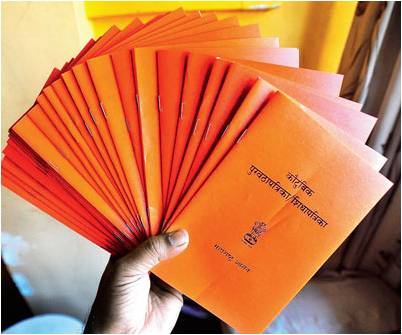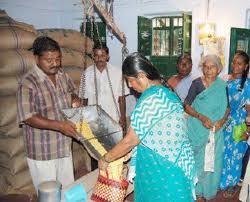 You can obtain an application for a ration card from your ration office or district office. There are three types cards, Yellow, orange and white. The yellow cards are given to families below the poverty line. Orange card is for those having an annual income between Rs.15,000/- and Rs.1 Lakh. Those families having an annual income of over Rs.1 lakh are given white cards.
You can obtain an application for a ration card from your ration office or district office. There are three types cards, Yellow, orange and white. The yellow cards are given to families below the poverty line. Orange card is for those having an annual income between Rs.15,000/- and Rs.1 Lakh. Those families having an annual income of over Rs.1 lakh are given white cards.
The Food and Civil Supplies Department of the state government controls the functioning of the PDS (Public Distribution System) and policy decisions are taken by the Rationing Controller. Card holders should not be intimated by threats made by the rationing shopkeeper. He has no powers to seize, change or cancel their cards. Approach the Public rations Officer at Window No. 1 for Free assistance. Do not involve any middlemen who approach you.
To obtain a new ration card:
- Fill up form No. 1 with a fee of Rs 5 only
- Basic information form to be filled in Hindi or Marathi (so spelling mistakes are not made when they translate from English). This form can be obtained and submitted at your local rationing shop.
- Attested true copy of address proof (Electric bill, bank pass book, election voter’s ID etc.)
- Head of the family photograph
- After maximum 2 door visits by the officer; if nobody belonging to applicants family is found present, then application will be disposed off.
Relevant forms to be filled up by card holders:
- For a new ration card, fill up form No. 1
- For adding names to an existing card, fill up from No. 8
- For deleting names from the card, fill up Form No. 9 and get a certificate from the ration office to this effect.
- For other alterations such as change of address fill up from No. 14.
- To replace a lost or mutilated ration card, fill up from No. 15.
 If the card holder is moving to Mumbai from districts or from outside the state, he will have to get a surrender slip from his old rationing office and present it at the new rationing office. If the card holder did not have a ration card in his former home he will have to get a certificate from the ‘talathi’ of his district to this effect. In case where documentary evidence cannot be produced, the Rationing Inspector will inspect the home, verify the statement of the applicant and issue a temporary card.
If the card holder is moving to Mumbai from districts or from outside the state, he will have to get a surrender slip from his old rationing office and present it at the new rationing office. If the card holder did not have a ration card in his former home he will have to get a certificate from the ‘talathi’ of his district to this effect. In case where documentary evidence cannot be produced, the Rationing Inspector will inspect the home, verify the statement of the applicant and issue a temporary card.
Consumer Guidance Society of India reports that, to obtain a ration card applicants do not need to have a fixed residence. Tenants, sub-tenants, pavement dwellers, temporary construction workers, contract labour and hostels can all obtain ration cards after inspection to verify produce a “no objection” certificate from the owner of the premises.
The ration shop has to display:
- The registration number of the ration shop (ARS No.).
- The number, address and phone number of the ration office.
- The inspector’s name and the time of his weekly visit.
- The stock position of all rationed commodities in units.
- The official price list.
- The total number of ration cards registered with the shop.
- The total number of units.
A complaints book has to be available to card holders. If the grains are of bad quality you have a right to complain and have then exchanged. Samples of the available food grains have to be displayed in the ration shops in sealed plastic bags bearing the number of the godown and the date of delivery. The card holder can compare the quote given to him with the sample in the bag and ensure that he is given the same quality. If samples are displayed in plates you could be cheated. All complaints to the Ration office must be in Marathi. The Ration Kriya Samiti has drafted detailed letters that will enable one to send effective complaint that will address their ration problems.
